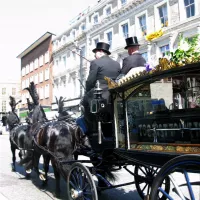From career breakthroughs to professional milestones, explore how Peter Baker (British politician) made an impact.
Peter Baker was a British Conservative politician and soldier who served as the MP for South Norfolk. He is most notable for being the last MP to be expelled from the House of Commons following a conviction for forgery. Beyond his political career, Baker was also an author and publisher. His life and controversial expulsion from Parliament are believed to have inspired the character of Martin York in Muriel Spark's novel *A Far Cry From Kensington*.
16 hours ago : Trump, Military Politicization Concerns Rise Amid Army's 250th Birthday Celebration in 2025
The opinions highlight worries about Trump's actions and the politicization of the military. The Army plans a 250th birthday celebration on June 14, 2025, but the political climate raises concerns about its role.
March 1940: Officer training
In March 1940, Baker was posted to an Officer Cadet Training Unit in Catterick Garrison after enlisting in the Royal Artillery.
September 1940: Commissioned as 2nd Lieutenant
On September 7, 1940, Baker was commissioned as a 2nd Lieutenant.
1940: Editing Resurgam Poets
In 1940, Baker took charge of editing a broadsheet of poems named Resurgam Poets, which included some of his own works.
October 1941: Posting to Military Intelligence
In October 1941, Baker accepted a posting to be a Staff Captain in Military Intelligence based at the War Office.
June 1943: Assignment to Phantom unit in North Africa
In June 1943, Baker was assigned to the Phantom unit in North Africa at camp Bugeaud in Bône, Algeria, following training and exercises in Britain.
1944: Participation in Operation Marathon
In 1944, Baker participated in Operation Marathon, led by Airey Neave, that rescued 152 Allied pilots hidden in the Fréteval Forest near Châteaudun. He later returned to save other escapees and accompanied Neave to Paris, Brussels, and the Netherlands.
1944: Publication of "The Land of Prester John"
In early 1944, while in Britain, Baker's poem sequence "The Land of Prester John" was published, which he felt received a poor critical reception.
1945: Publication of The Silent Revolution
Late in 1945, Peter Baker added an epilogue to his essay "The Silent Revolution" which reflected on the impact of peace on the wartime generation.
1946: Publication of Confession of Faith
In 1946, Baker's war memoirs, titled Confession of Faith, were published by his own publishing company, Falcon Press.
1950: Elected as MP for South Norfolk
In the 1950 general election, Baker won the seat for South Norfolk with 18,143 votes, defeating the Labour candidate, Christopher Mayhew. He was then the youngest MP.
1951: Re-elected in general election
In the 1951 general election, Baker was re-elected as MP for South Norfolk.
1952: Sale of British Book Centre
In 1952, Robert Maxwell bought the British Book Centre in New York from Baker.
May 1954: Announcement not to seek re-election
In May 1954, Baker announced that he would not seek re-election due to ill-health, after suffering a nervous breakdown.
December 1954: Expulsion from the House of Commons
In December 1954, Peter Baker was expelled from the House of Commons following his conviction for forgery. On December 16, 1954, a motion was agreed upon to remove him.
December 1954: Expulsion
Peter Baker was expelled on 16 December 1954.
1954: Improvisation of a Pageant at the Royal Albert Hall
In 1954, Baker improvised a Pageant to fill the Royal Albert Hall, garnering 15,000 requests for the 8,000 available seats.
May 1955: Petition to Home Secretary
In May 1955, Baker petitioned the Home Secretary for a retrial, an appeal out of time, a public inquiry, or immediate release.
November 1955: Appeal Hearing Adjourned
On 21 November 1955, Baker's appeal hearing at the Court of Criminal Appeal was adjourned because his counsel was not prepared.
March 1956: Alleged Assurances of Release
In March 1956, Baker claimed that Hugh Quennell had assured him that the Home Office intended to release him by March 1956, which led Baker to withdraw his appeal.
1956: Second Application for Leave to Appeal
In 1956, Baker prepared a second application for leave to appeal, gathering documents and witnesses.
January 1957: Appeal Refused and Transfer to Open Prison
On 28 January 1957, Baker was refused leave to appeal. Immediately after, he was transferred from Wormwood Scrubs to HM Prison Leyhill.
October 1959: Release from Wormwood Scrubs and Interview
On 23 October 1959, Baker was released from Wormwood Scrubs and gave an interview to the Daily Express, stating his intention to bring back his family.
December 1959: Bankruptcy Discharge Suspended
On 17 December 1959, Baker applied for discharge from bankruptcy, but the discharge was suspended after creditors received only 0.1611d. in the £.
February 1960: Rejected by Robert Maxwell
In February 1960, Baker asked Robert Maxwell for a director position in his new publishing company, but was refused.
1961: Publication of Prison Memoirs
In 1961, Baker's prison memoirs, "Time Out of Life" by Heinemann, were published with a foreword by the Earl of Longford.
April 1962: Bankruptcy Discharge Allowed
In April 1962, Baker's discharge from bankruptcy was allowed after a two years and six months suspension.
May 1963: Supplemental Dividend Paid
In May 1963, a supplemental dividend of 0.196d. in the £ was paid to Baker's creditors.
September 1963: Earl Attlee Supports Inquiry
In September 1963, Baker persuaded Earl Attlee, the former Labour Prime Minister, to support an inquiry into his case.
1965: Petition for Royal Pardon
In 1965, Baker unsuccessfully petitioned for a Royal Pardon.
April 1966: New Bankruptcy Petition Filed
On 4 April 1966, Baker's creditors filed a new bankruptcy petition against him.
July 1966: Receiving Order Made
On 22 July 1966, a receiving order was made against Baker.
Mentioned in this timeline

Christmas is an annual festival celebrated on December th commemorating...
Africa is the second-largest and second-most populous continent comprising of...
Australia officially the Commonwealth of Australia encompasses the Australian mainland...

Books are a means of storing information as text or...
The Netherlands also known as Holland is a country in...

Falcons are birds of prey belonging to the genus Falco...
Trending

25 minutes ago Lorde Extends Ultrasound Tour with New Barclays Center Shows in NYC

1 hour ago Funeral Director Death, Kansas City Funeral Home License Revoked Amid Remains Scandal
1 hour ago Shooting at Westfest Festival in West Valley City Leaves Multiple People Injured.
1 hour ago Celine Song's 'Materialists': Talking Pictures, Romance, and Matchmaker Critiques Dakota Johnson.
Ramsey County Minnesota established in and named after Alexander Ramsey is the state's second-most populous with an estimated residents in...

2 hours ago Joaquín Correa Faces Unexpected Question About Ángel Correa; Botafogo Player Clarifies Relationship
Popular

The Boeing Dreamliner is an American wide-body airliner developed by...

Greta Thunberg is a Swedish climate activist who gained international...

Thomas Douglas Homan is an American law enforcement officer and...

Cristiano Ronaldo often called CR is a Portuguese professional footballer...

Gavin Newsom is an American politician and businessman currently serving...

Donald John Trump is an American politician media personality and...

